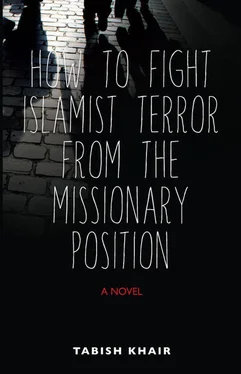So, apart from the incongruity of tall, elegant, clean-shaven, all-rules-barred Ravi, as twice-born a Hindu as any Brahmin, doing his best to be a meticulous impure Muslim—he had confessed that the only Muslims he really knew as a child were (out-house) servants of the family—I was simply unable to provide him with the necessary guidance. Karim Bhai was not so religiously challenged. He performed the pre-prayer wazu as the sort of art that it was meant to be in deserts with little water; he knew his surahs inside out; he did not need to sneak a glance to the left or the right before going into sijda or standing up. That he agreed to supervise Ravi surprised me, but then I understood: as a religious Muslim, he could not refuse such a request. It was enjoined on all Muslims to preach the final and unalloyed word of God. To convert a non-Muslim to Islam is to be shown the secret side door to paradise. How could Karim Bhai have refused Ravi?
Teaching time, he now announced to Ravi.
Clear out, shameless degenerate, Ravi said to me. He did not want me around because he claimed that my smirk disturbed his concentration. I continued reading the Proust (in translation) that I was re-reading, as an antidote to teaching literature in the English Department of Århus University.
Karim Bhai was a good trainer. He put Ravi through his paces. He was calm, determined and precise. As the Muslim prayers come with different combinations of verses and postures, I knew that Ravi had a long education ahead of him. And a painful one, for some of the postures are remarkably hard to maintain for more than a few seconds.
Later that evening, on our way to Under Masken, almost the only bar in town that allowed one to smoke in peace, Ravi groaned. “Now I understand why you fucking mullahs came over and colonized us. It was not the gunpowder and the cannons. It was the namaaz. While we were sitting around on our backsides, jingling bells at our gods, you were working out five times a day. The namaaz is the gym of Islam; that’s why they hate it so much in the West. It is too much competition for their fucking health businesses.”
Ravi was never as reverent about my religion when he was with me as he was with Karim Bhai.
It was a Thursday evening, and Under Masken was already crowded when we got there. We still had half an hour to kill before our double dates arrived. We managed to get a corner table under the usual assortment of masks and trinkets. A huge aquarium lined the wall behind us.
Ravi lit a cigarette. I had smoked occasionally, at parties or on nights out, but Ravi had started smoking just a couple of years back, when smoking was banned in public places in Denmark. He claimed the ban was proof of the sexist and anti–working-class turn of Denmark in recent years, for it was mostly women and working-class men who still smoked. He decided to oppose it by smoking at least one cigarette per day and so far he had steadfastly adhered to his sole, silent, smoking protest against the ruling powers of Denmark.
He offered me a cigarette from his packet of Marlboro. I declined. A rare smoker, I did not feel that the cigarette fog in the pub required any further contribution from me.
The women who entered, within a minute of each other, did not look very different from their photos on the dating site. That was a relief. They also appeared to be able to identify us easily, though of course any two South Asians in any bar in Århus could not be too difficult to locate. Introductions over, drinks fetched (by Ravi, the generous), our conversation hesitated and hiccupped like an antique car; then it rolled down the kind of incline that I had become familiar with over the past few months of internet dating in Denmark.
The initial weeks had been a surprise, though I’d been forewarned by Ravi, who had been religiously dating on the internet, and elsewhere, since his arrival in Denmark. Between us, he liked to point out, we had experience of dating in five countries: India, Pakistan (though Ravi had reservations about the existence of real dating in that country), England, the USA, and Switzerland. Switzerland and the USA, where he had spent various periods as student or journalist, were Ravi’s contribution to the list, as was India. But Denmark, Ravi claimed, was different. It was perhaps the only country left in the Western Hemisphere where 80 percent of all women were afraid of dating a colored man and all but one percent of the rest would only date colored men if they had a chance. A bit like England in the 1950s; this progressive country is a few decades behind the rest in some areas, Ravi insisted.
At first inclined to dismiss this as predictable rhetoric from Ravi, over the past few months I’d had to concede that it did contain a kernel of truth. Now, in the music-filled smoky atmosphere of Under Masken, my conversation with my date—a tall, floridly beautiful platinum blonde, who made a striking contrast to Ravi’s smaller, thinner date, a woman with a hard mouth and spiky brown hair—proceeded down familiar avenues. Ravi’s date, after establishing her credentials with Ravi by criticizing the Danish People’s Party and its anti-immigrant politics, had proceeded, a bit surprisingly, to launch into a detailed analysis of last night’s handball semi-final between Denmark and Spain, which Denmark had won after trailing in the first quarter. I knew Ravi must be squirming in the depths of his casually clad soul, as he had no interest whatsoever in any ball game: Ravi was of the opinion that the West’s fascination with ball games, sadly being communicated to the rest, was susceptible to Freudian analysis, and not necessarily from the angle of the Oedipus complex. When my platinum blonde, after mentioning her love of Tolkien, which was perhaps evoked by the fact, glaringly mentioned in my dating profile, that I “loved, read and taught (but did not write) literature,” proceeded to tell me how she never dated Danish men, who were always so incredibly boring, I knocked Ravi’s knee three times with my knee. This was one of our established signals. There was a pause. Then he tapped back three times. He had agreed.
Two minutes later, I excused myself, went to the dingy little poster-ridden toilet on the other side of the bar and called Ravi on his mobile. He answered with alacrity. I mumbled a 1960s Bombay film song into the receiver. He replied gobbledygook in Hindi, with a few suitably intonated English words—especially “hospital?,” “hospital!” “hospital”—thrown in. When I returned from the toilet, Ravi had bad news for me: our cousin had called. Another cousin had been hit by a car. Oh no, I said. We had to meet both the cousins at a hospital where the first cousin was rushing the second cousin.
Our dates looked suitably concerned. They were nice Danish girls with nice Danish hearts. We looked suitably disappointed. We knew from experience that the fact that Ravi and I did not resemble each other in any way would not be noticeable to them; it seldom is to most people in Denmark.
“Families,” said Ravi, the dramatist, unable to resist the temptation to improvise, “that’s what happens when you have large, extended families.”
The girls nodded in sympathy: they read the newspapers and knew all about immigrants with their large families, all of them cramped into little Denmark. Some other time, I am sure, I said, pulling Ravi away before he over-improvised.
We did not have to disguise the haste with which we left.
A few streets away, we dived into the kind of pub that smart young Danish women never enter. Very few of these have been left standing, but there is one at the corner of Christiansgade and Frederiksvej. Dirty and uninviting from the outside; dark, forbidding and smelly inside. Four middle-aged men on stools at the bar turned around to watch us enter. One man revolved all the way around under his initial impetus and had to try again. Two of them kept staring at us, for this was also the kind of pub that colored men did not enter.
Читать дальше












